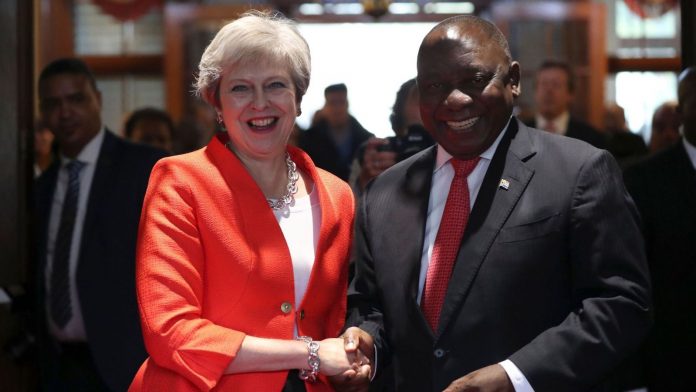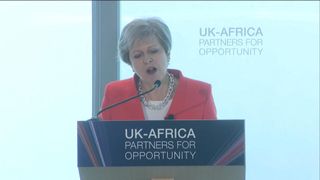[ad_1]
Theresa May has made an “unashamed” vow to ensure foreign aid spending benefits UK interests.
Speaking during a three-day trip to Africa, the prime minister outlined her ambitions for the continent, declaring her desire for the UK to become the G7’s leading investor there by 2022.
Mrs May pledged to invest an extra £4bn in African economies, with it hoped this will pave the way for “another £4bn in private sector finance” as a result of renewed business confidence in the continent.
She reasserted her shift in strategy over aid spending and wants to use the trade mission to South Africa, Nigeria and Kenya to drum up private sector investment alongside efforts to fight extreme poverty.
The PM said it was her view that foreign aid “works”, adding: “We will remain a global champion for aid spending, humanitarian relief and international development.
“We will continue our commitment to spend 0.7% of gross national income on official development assistance. And we will not falter in our work to deliver the Sustainable Development Goals.
“But I am also unashamed about the need to ensure that our aid programme works for the UK.
“So today I am committing that our development spending will not only combat extreme poverty, but at the same time tackle global challenges and support our own national interest.
“This will ensure that our investment in aid benefits us all, and is fully aligned with our wider national security priorities.”
Speaking at the First National Bank in Cape Town, Mrs May said the private sector was key to driving growth and “unleashing the entrepreneurial spirit” in Africa.
She said: “However, for a variety of reasons the private sector has not yet managed to deliver the level of job creation and investment that many African nations need.
“So I want to put our development budget and expertise at the centre of our partnership as part of an ambitious new approach – and use this to support the private sector to take root and grow.”
Britain’s overseas aid budget stood at £13.9bn in 2017, an increase of £555m on the year before. This is in line with the legal commitment to invest 0.7% of GDP.
But the pledge is opposed by some backbenchers within Mrs May’s party, who want the money spent on domestic priorities.
A number of international development secretaries have promised to use the money to help develop Britain’s post-Brexit trade around the world.
In that vein, the PM announced plans in her speech for the UK to carry over an EU free trade agreement with six South African nations once the terms of the European divorce are finalised.
She said: “We will today confirm plans to carry over the European Union’s economic partnership agreement with the South African Customs Union and Mozambique, once the EU’s deal no longer applies to the UK.”
Data from the UN Conference on Trade and Development shows UK direct investment in Africa stood at $55bn (£42.7bn) in 2016, compared to $57bn (£44.3bn) from the US.
This was followed by France in third with $49bn (£38bn) and China in fourth with $40bn (£31bn).
Mrs May said Britain’s private sector should put in the billions that will see “African economies growing by trillions”.
Business leaders and ministers are accompanying Mrs May on what is her first trip to Africa as PM, which will include talks with the presidents of all three countries she is visiting.
[ad_2]








